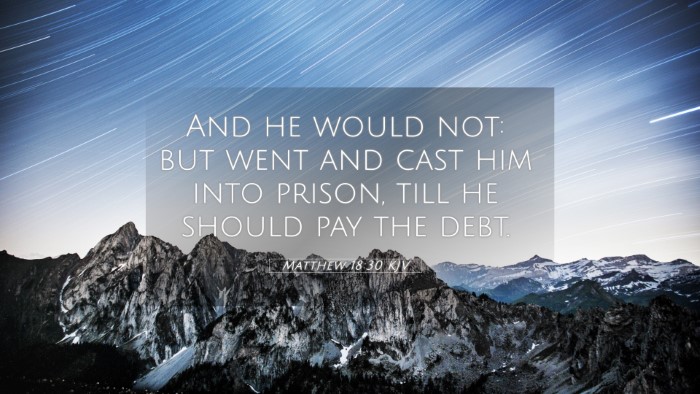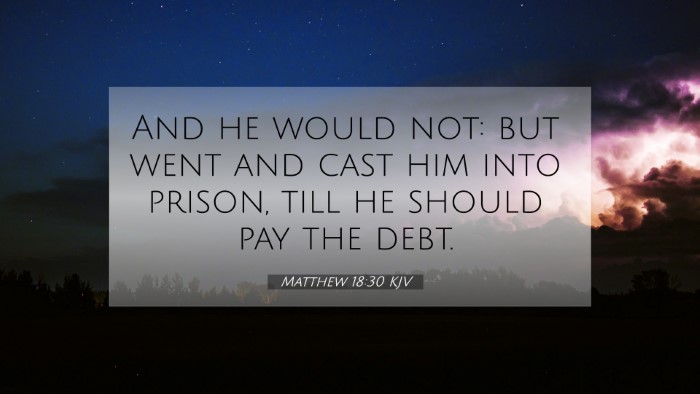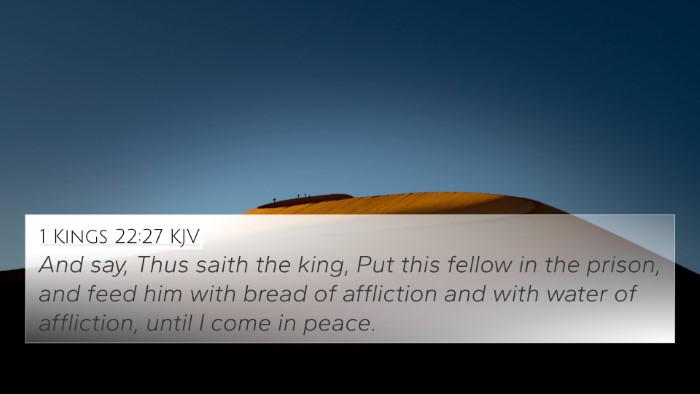Understanding Matthew 18:30
Bible Verse: Matthew 18:30 - "And he would not: but went and cast him into prison, till he should pay the debt."
Summary of Meaning
This verse is part of the Parable of the Unforgiving Servant, where Jesus teaches about forgiveness and the consequences of failing to forgive others. The servant, who had been forgiven a massive debt, refuses to show the same mercy to a fellow servant who owes him a much smaller sum, ultimately leading to severe consequences.
Commentary Insights
-
Matthew Henry:
Henry emphasizes the moral implications of the parable, pointing out that it illustrates the harsh repercussions of unforgiveness. The servant's refusal to forgive reflects a lack of gratitude for what he received and a failure to comprehend the enormity of God's mercy towards him.
-
Albert Barnes:
Barnes interprets this verse as a warning about the seriousness of our obligations to forgive others. He notes that the act of placing the fellow servant in prison symbolizes the severity of judgment faced by someone who refuses to extend grace after having received it themselves.
-
Adam Clarke:
Clarke dives deeper into the implications of this refusal, indicating that it not only leads to the suffering of the unforgiving servant but also illustrates the spiritual realities of the kingdom of heaven. The unforgiving servant's actions show a misunderstanding of divine forgiveness and justice.
Bible Cross-References
This verse connects with several other scriptures that underline the themes of forgiveness and mercy:
- Matthew 6:14-15: Emphasizes that forgiveness from God is contingent upon our willingness to forgive others.
- Luke 7:41-43: The parable of the two debtors illustrates the principle of forgiveness according to the extent one has been forgiven.
- Colossians 3:13: Encourages believers to forgive as the Lord forgave them.
- Ephesians 4:32: Appeals to kindness and compassion with an emphasis on forgiveness.
- James 2:13: Reminds us that judgment without mercy will be shown to anyone who has not been merciful.
- Romans 12:19: Affirms that vengeance belongs to the Lord, reminding us to leave judgment in God's hands.
- 1 John 1:9: States that if we confess our sins, He is faithful to forgive us, highlighting the importance of confession and mercy.
Connecting Thematic Elements
The parable and this verse specifically highlight several themes:
- The Importance of Forgiveness: The refusal to forgive correlates with a failure to understand God's grace.
- Consequences of Unforgiveness: The metaphorical imprisonment signifies spiritual consequences for an unforgiving heart.
- Gratitude for Grace Received: Reflecting on the debt forgiven should compel believers to extend grace.
Exploring Links Between Scriptures
Matthew 18:30 serves as a pivotal verse for understanding how biblical texts interlink with the overarching narrative of forgiveness throughout the Bible:
- Consider cross-referencing Matthew 18:30 with Matthew 5:7 on mercy.
- Connect it with Luke 6:37, which discusses judgment and measure.
- Examine the relationship with Mark 11:25, which insists on forgiveness in prayer.
Tools for Deeper Study
For those studying the themes of forgiveness and the connections between Bible verses, the following tools can be invaluable:
- Bible Concordance: A resource to find related verses quickly.
- Bible Cross-Reference Guide: Helps mark links between scriptures effectively.
- Bible Chain References: Offers an organized pathway to navigate interconnected verses.
- Comprehensive Bible Cross-Reference Materials: For in-depth thematic studies.
Conclusion
Matthew 18:30 serves as a profound reminder of the nature of forgiveness within the Christian faith. By engaging with public domain commentaries and connecting this verse to others in the scripture, readers gain a fuller understanding of its implications and the importance of mercy in their own lives. Approaching this scripture through a lens of comparative analysis enriches one’s study and application of biblical teachings.




